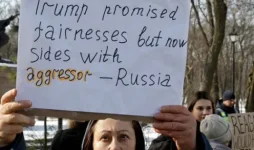The recent Oval Office encounter between President Volodymyr Zelensky and President Donald Trump proved challenging for Ukraine. Citizens watching from Kyiv felt their future was uncertain. Many Ukrainians expressed support for their leader despite concerns about diplomatic protocol. One resident near St Sofia's cathedral stated it might not have been diplomatic but came from genuine concern about survival.
Ukrainian public opinion typically unifies when external threats increase. Before the 2022 invasion, Zelensky had 37% approval, which jumped to 90% afterward. His rating stood at 52% before Trump returned to office in early 2025. After Trump made statements blaming Ukraine for the conflict, Zelensky's approval reached 65%. Many citizens perceived disrespect from American leadership during the recent meeting.
The director of the Kyiv International Institute of Sociology explained that difficult situations often increase patriotic sentiment among Ukrainians. Zelensky previously experienced popularity decreases following the unsuccessful counteroffensive of 2023 and after dismissing Commander Valeriy Zaluzhnyi. The new American approach toward Ukraine has created additional pressure, compelling the nation to prepare for more complicated circumstances and potential warming of US-Russia relations.
Opposition representative Inna Sovsun described the initial reaction as a shock, finding it troubling to watch their president face criticism from America. Ukrainian media presented a more measured account, reporting that a proposed minerals agreement between the countries remained unsigned. The deal lacked American security guarantees that Ukraine considers essential. Sovsun suggested Ukraine should seek stronger alliances with European nations, Canada, Australia, and Japan.
Tension exists between Washington and Kyiv officials. Sovsun believes negotiations should continue but with appropriate intermediaries trusted by both sides. She emphasized that calls for presidential resignation should be rejected regardless of political differences. Zelensky had hoped his visit would strengthen American cooperation and eventually lead to peace. Ukrainians strongly desire peace but remain concerned about rushed settlements, remembering how previous ceasefires in 2014 and 2015 ultimately provided Russia time to prepare further military actions.
Ukrainian MP Ivanna Klympush-Tsyntsadze anticipated less support during Trump's second presidency but was surprised by the extent. She noted the mineral agreement did not include commitments for continued military assistance. Despite suspended elections, parliamentary support for Zelensky remains unified. Some representatives have requested greater involvement in negotiations. Former President Poroshenko, despite political differences with Zelensky, affirmed his legitimacy to counter American and Russian claims suggesting otherwise.
The conflict continues despite peace discussions. Russia maintains demands for Ukrainian political surrender and control of four regions. Taras Chmut from the Come Back Alive foundation stated that the conflict extends beyond territorial disputes and will influence the future global order. Trump pursues his America First policy, expecting Europe to handle regional security matters. European nations remain divided but generally agree that peace cannot be achieved without American involvement.
Chmut warned against wishful thinking about miraculous resolutions. He urged countries to acknowledge current realities and take appropriate action, suggesting that inaction could lead to further instability beyond Ukraine. Air raid sirens and missile strikes remind everyone that active warfare persists despite ongoing diplomatic discussions about potential resolution path forward.
Ukrainian public opinion typically unifies when external threats increase. Before the 2022 invasion, Zelensky had 37% approval, which jumped to 90% afterward. His rating stood at 52% before Trump returned to office in early 2025. After Trump made statements blaming Ukraine for the conflict, Zelensky's approval reached 65%. Many citizens perceived disrespect from American leadership during the recent meeting.
The director of the Kyiv International Institute of Sociology explained that difficult situations often increase patriotic sentiment among Ukrainians. Zelensky previously experienced popularity decreases following the unsuccessful counteroffensive of 2023 and after dismissing Commander Valeriy Zaluzhnyi. The new American approach toward Ukraine has created additional pressure, compelling the nation to prepare for more complicated circumstances and potential warming of US-Russia relations.
Opposition representative Inna Sovsun described the initial reaction as a shock, finding it troubling to watch their president face criticism from America. Ukrainian media presented a more measured account, reporting that a proposed minerals agreement between the countries remained unsigned. The deal lacked American security guarantees that Ukraine considers essential. Sovsun suggested Ukraine should seek stronger alliances with European nations, Canada, Australia, and Japan.
Tension exists between Washington and Kyiv officials. Sovsun believes negotiations should continue but with appropriate intermediaries trusted by both sides. She emphasized that calls for presidential resignation should be rejected regardless of political differences. Zelensky had hoped his visit would strengthen American cooperation and eventually lead to peace. Ukrainians strongly desire peace but remain concerned about rushed settlements, remembering how previous ceasefires in 2014 and 2015 ultimately provided Russia time to prepare further military actions.
Ukrainian MP Ivanna Klympush-Tsyntsadze anticipated less support during Trump's second presidency but was surprised by the extent. She noted the mineral agreement did not include commitments for continued military assistance. Despite suspended elections, parliamentary support for Zelensky remains unified. Some representatives have requested greater involvement in negotiations. Former President Poroshenko, despite political differences with Zelensky, affirmed his legitimacy to counter American and Russian claims suggesting otherwise.
The conflict continues despite peace discussions. Russia maintains demands for Ukrainian political surrender and control of four regions. Taras Chmut from the Come Back Alive foundation stated that the conflict extends beyond territorial disputes and will influence the future global order. Trump pursues his America First policy, expecting Europe to handle regional security matters. European nations remain divided but generally agree that peace cannot be achieved without American involvement.
Chmut warned against wishful thinking about miraculous resolutions. He urged countries to acknowledge current realities and take appropriate action, suggesting that inaction could lead to further instability beyond Ukraine. Air raid sirens and missile strikes remind everyone that active warfare persists despite ongoing diplomatic discussions about potential resolution path forward.












